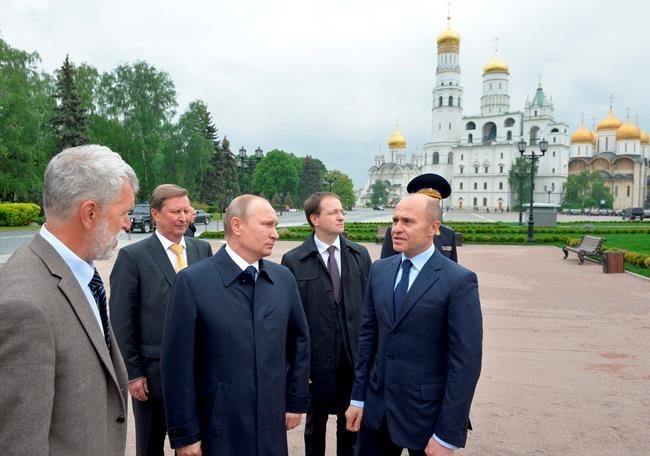
Russian President Vladimir Putin, center, visits a park set in the place of a Soviet-era administrative building which was recently razed in the Kremlin in Moscow, Russia, Tuesday, May 17, 2016. At right is accompanied by Kremlin Chief Property Manager Alexander Kolpakov, at left is director of the Institute of Archaeology of the Russian Sciences Academy Nikolai Makarov. Second right back, Culture Minister Vladimir Medinsky. (Alexei Druzhinin/Sputnik, Kremlin Pool Photo via AP)
May 18, 2016 - 7:50 AM
MOSCOW - Russian lawmakers on Wednesday gave tentative approval to forming a national guard, with some saying the Kremlin needs the new force as a tool against possible unrest.
Members of the lower house, the State Duma, quickly and overwhelmingly endorsed the bill in the first of three required readings, with only the communists speaking out against it.
President Vladimir Putin announced forming a national guard last month, saying his former chief bodyguard, Viktor Zolotov, would be put in charge of it. Putin said the force would focus on the fight against extremism and organized crime, but some observers saw its creation as a reflection of Kremlin fears of possible anti-government protests amid an economic downturn.
Communist Vyacheslav Tetekin said during Wednesday's debate that his party sees a link between the move and the sagging economy.
"The creation of the national guard is connected to the worsening social and economic situation in the country," he said.
The Duma voted 345-14 for the bill, with most of the communist faction not voting for the motion. The full approval of the document is seen as a mere formality in the Kremlin-controlled parliament.
The Russian economy plunged into recession last year under the double blow of low oil prices and Western economic and financial sanctions against Russia over its action in Ukraine. Public support for Putin so far has remained high, but experts forecast it to shrink as broader shares of the population are affected by the economic crisis.
Amid the economic challenges, the Kremlin is keen to maintain tight control over political scene before the parliamentary election in September and the next presidential vote in 2018.
"Forming the national guard is possibly linked to the forthcoming election and the need to preserve any excesses," Tetekin said.
Reports of ballot fraud in favour of the main Kremlin party during the 2011 parliamentary election triggered a wave of massive street protests in Moscow against Putin's rule. After his re-election the following year, Putin responded with a number of repressive bills stifling the opposition.
The new bill would give a national guard an arsenal of means to quell mass disturbances, such as stun grenades and anti-riot vehicles. It specifies that national guardsmen wouldn't be permitted to use force against pregnant women and children unless they offer armed resistance, in line with Russian legal norms.
Russian media outlets estimated that a national guard could include up to 400,000 troops, drawing forces from both Interior Ministry troops and riot police. Opponents of the bill argued that it would drain the nation's police force and weaken its ability to combat crime.
Flamboyant ultranationalist leader Vladimir Zhirinovsky said during the parliamentary debate that forming a national guard is essential to tame "any mutineers, revolutionaries and extremists."
"If Gorbachev had approved such a bill, there wouldn't have been 1991," he said in a reference to the Soviet collapse. Zhirinovsky urged to recruit "young patriots" in the new force and give them generous funds and "beautiful uniforms," so that "we don't even hear such words as revolution, strife and revolt."
News from © The Associated Press, 2016